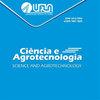Seed germination and performance of sunflower seedlings submitted to produced water
IF 0.9
4区 农林科学
Q2 AGRICULTURE, MULTIDISCIPLINARY
引用次数: 1
Abstract
ABSTRACT The use of produced water becomes an option in the irrigation of non-food crops with potential for biofuel production. However, its effects on different stages of plant development and mainly on seed germination should be known. The study was conducted to evaluate the performance of sunflower seedlings subjected to different types of produced water. An experimental design in a factorial scheme was adopted to evaluate 3 cultivars (Catissol 01, Embrapa 122 and IAC Iaramã) and 6 types of water (distilled water - control, public-supply water, water resulting from the water and oil separation process - WOS, filtration in sand filter - SAF, filtration in sand + charcoal filter - SCF, and filtration in sand + osmosis filter - SOF). In addition, the substrate was moistened with polyethylene glycol (PEG) solutions, simulating the osmotic potentials of the evaluated waters, and a sensitivity test was conducted with lettuce seeds under conditions similar to those adopted for sunflower. The cv. Catissol showed higher percentages of germination and vigor of seedlings, regardless of the water used. There was a trend of reduction in germination and vigor of seedlings with the use of produced water treated with the WOS, SAF and SCF systems. All water potentials simulated by PEG solutions reduced the germination and vigor of lettuce seeds, and the effect was more pronounced for the WOS system. SOF was the only one capable of making the produced water non-toxic to sunflower seeds and lettuce seedlings.向日葵幼苗在采出水中的发芽和表现
摘要:在具有生物燃料生产潜力的非粮食作物灌溉中,使用采出水成为一种选择。然而,它对植物发育的不同阶段,主要是对种子发芽的影响应该是已知的。本研究旨在评估向日葵幼苗在不同类型的采出水中的表现。采用析因方案的实验设计对3个品种(Catissol 01、Embrapa 122和IAC Iaramã)和6种类型的水(蒸馏水-对照、公共供水、水和油分离过程产生的水-WOS、砂滤器过滤-SAF、砂滤+炭滤器过滤-SCF和砂滤+渗透过滤器过滤-SOF)进行了评估。此外,用聚乙二醇(PEG)溶液润湿基质,模拟评估水的渗透势,并在与向日葵相似的条件下用莴苣种子进行敏感性测试。无论用水量如何,Catissol的幼苗发芽率和活力都较高。使用WOS、SAF和SCF系统处理的采出水有降低幼苗发芽率和活力的趋势。PEG溶液模拟的所有水势都降低了生菜种子的发芽率和活力,WOS系统的影响更为明显。SOF是唯一一种能够使采出水对向日葵种子和生菜幼苗无毒的方法。
本文章由计算机程序翻译,如有差异,请以英文原文为准。
求助全文
约1分钟内获得全文
求助全文
来源期刊

Ciencia E Agrotecnologia
农林科学-农业综合
CiteScore
2.30
自引率
9.10%
发文量
19
审稿时长
6-12 weeks
期刊介绍:
A Ciência e Agrotecnologia, editada a cada 2 meses pela Editora da Universidade Federal de Lavras (UFLA), publica artigos científicos de interesse agropecuário elaborados por membros da comunidade científica nacional e internacional.
A revista é distribuída em âmbito nacional e internacional para bibliotecas de Faculdades, Universidades e Instituições de Pesquisa.
 求助内容:
求助内容: 应助结果提醒方式:
应助结果提醒方式:


